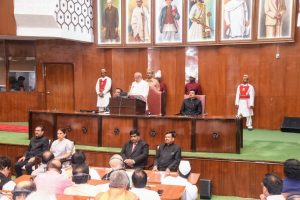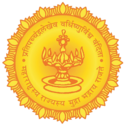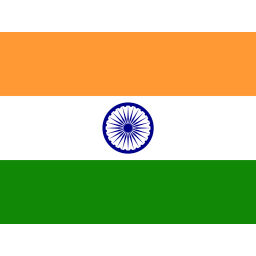03.03.2025: Progressive and Developed Maharashtra in the Making – Governor

Progressive and Developed Maharashtra in the Making
– Governor C. P. Radhakrishnan
State Budget Session Commences with Governor’s Address
Mumbai, March 3: The government prioritizes empowerment of farmers, women, and underprivileged sections, alongside strengthening health, employment, industries, and infrastructure. The state government is working inclusively to build a progressive, forward-thinking, and developed Maharashtra, stated Governor C. P. Radhakrishnan during his address at the State Budget Session.
Prioritizing Farmers’ Welfare
Governor Radhakrishnan highlighted that the state government is making decisions that expand opportunities in the agricultural sector and prioritize farmers’ interests. Under the “Maa Gele Tyala Solar Pump Yojana,” 3,12,000 solar pumps have been installed to provide irrigation water through solar-powered pumps. Over the next five years, 1 million solar pumps will be provided to farmers. The state aims to become the first in the country to make all agricultural power lines solar-powered under the “Pradhan Mantri-Kusum” and “Mukhyamantri Solar Krishi Vahini Yojana.” In a record nine months, Maharashtra has operationalized 119 power lines with a cumulative solar power capacity of 147 MW.
To support silk-producing farmers in Jalna district, an open market has been established for the purchase and sale of silkworm cocoons. The infrastructure is complete, and the market will soon be opened, boosting silk production and productivity in the region.
Under the “Pradhan Mantri Kisan Samman Yojana,” more than 9.5 million farmers in Maharashtra have been identified as beneficiaries, with over 8.7 million receiving Kisan Credit Cards through banks. The scheme aims to provide financial aid and loan facilities to empower farmers. For the financial year 2024-25, the target is to distribute crop loans worth INR 74,781 crore, of which INR 55,334 crore has already been disbursed through banks.
In the current year, under the “Silt-Free Dams, Fertile Fields” initiative, 40 million cubic meters of silt have been removed from 1,274 reservoirs, benefiting over 95,000 acres of farmland and 31,000 farmers. The “Pradhan Mantri Krishi Sinchan Yojana” is promoting watershed management awareness and encouraging public participation through the “Watershed Yatra” from February 8 to March 31, 2025, covering 140 projects across 30 districts.
Maharashtra is implementing the “Atal Bhujal Yojana” effectively to promote sustainable groundwater management through institutional strengthening, capacity building, and convergence. With an investment of INR 1,336 crore, the scheme has brought more than 132,000 hectares of farmland under micro-irrigation.
A new initiative, “Agristack” – Agricultural Digital Public Infrastructure, has been launched to ensure efficient digital service delivery of government schemes to farmers.
To promote sustainable energy and reduce carbon emissions, the state is focusing on ethanol as an alternative fuel. For 2024-25, the state aims to supply 121 crore liters of ethanol through sugar mills to oil companies. Under the “Minimum Support Price Scheme,” 5,62,000 metric tons of soybeans have been procured through 562 procurement centers.
For the 2024-25 Kharif marketing season, over 700,000 metric tons of paddy and 171 metric tons of coarse grains have been procured. To ensure fair agricultural trade, the “One Taluka, One Agricultural Market Committee Scheme” is being implemented.
The “Dr. Shyama Prasad Mukherjee Jan-Van Vikas Yojana” is providing individual solar fencing to over 10,000 beneficiaries in sensitive villages, with grants of up to INR 15,000, reducing human-wildlife conflicts in and around tiger reserves.
The government has swiftly provided relief to farmers affected by natural calamities, distributing INR 814 crore to more than 7.8 lakh farmers.
Two new government veterinary colleges will be established in Parli (Beed district) and Baramati (Pune district).
Women’s Development
Under the centrally sponsored “Namo Drone Didi” scheme, the government plans to distribute drones for agricultural use to 325 women self-help groups in 2024-25. To enhance female workforce participation and provide affordable, safe housing in cities, the government has proposed constructing hostels for working women under the “Special Assistance for Capital Investment to States Scheme 2024-25.”
To boost women’s employment opportunities, recruitment for 18,000 vacant positions for Anganwadi workers is underway. The “Lakhpati Didi” initiative aims to increase the annual income of women to at least INR 1 lakh. So far, 1.7 million women have benefited, and the government aims to empower 2.6 million rural women under this scheme by 2024-25.
The state has established 18 corporations for various communities, allocating INR 50 crore each.
To educate children about Chhatrapati Shivaji Maharaj’s life and contributions, every Anganwadi will celebrate his birth anniversary annually. Coaching classes for Scheduled Tribe students preparing for engineering and medical entrance exams will be introduced.
Education Expansion
Maharashtra has the highest number of NAAC-accredited colleges and universities in India, reflecting its commitment to improving education quality. The National Education Policy (NEP) 2020 is being implemented with appropriate financial provisions.
To preserve Nashik’s Ramayana-era heritage, the “Ram-Kaal-Path” project will transform the city into a comprehensive pilgrimage site.
A “Maharashtra Cyber Security Project” has been launched in Mahape, Navi Mumbai, to assist police personnel in investigating cyber crimes, particularly those affecting women, children, and senior citizens.
Strengthening Healthcare Facilities
Under the National Health Mission, contractual employees with 10 years of service will be regularized. A new “Post Basic Diploma in Oncology Nursing” will be introduced to ensure trained nurses are available for cancer care.
To strengthen healthcare staff, three new B.Sc. Nursing colleges will be established in Nashik, Sindhudurg, and Satara.
A new company, “Consortia for Health, Applied Knowledge, and Research Autonomy,” will be set up to make Maharashtra a center for medical research and innovation. Maharashtra University of Health Sciences (Nashik) will serve as the central institution, with seven government medical colleges functioning as supporting centers.
Seven special healthcare campaigns, including blood donation, organ donation, cancer awareness, obesity, thyroid disorders, cataract blindness prevention, and oral health, will cover 100,000 beneficiaries by March 2025.
Maharashtra leads the nation in Ayurveda outreach under the “Desh Ka Prakriti Parikshan” initiative, with over 4 million citizens screened.
Leading in Foreign Investment
Maharashtra remains the preferred destination for Foreign Direct Investment (FDI) and contributes over 14% to India’s GDP. At the World Economic Forum in Davos (January 2025), the state signed MoUs worth INR 15.72 lakh crore with 63 national and international companies, creating over 15 lakh jobs.
To boost industrialization, Maharashtra Industrial Development Corporation (MIDC) will allocate 3,500 acres of industrial land, with plans to notify an additional 10,000 acres. Ten integrated industrial and logistics centers will be developed.
Maharashtra has launched the “Maharashtra Technical Textile Mission” to strengthen the textile sector and has participated in “Bharat Tex-2025,” enhancing global market access for state-produced textiles.
Skill-Based Employment Creation
To enhance youth employability, the “Mukhyamantri Yuva Karya Prashikshan Yojana” has trained over 1,32,000 youth, with a target of 1 million by 2024-25, supported by an INR 5,500 crore allocation.
To provide job opportunities, 611 “Pandit Deendayal Job Fairs” have been organized, employing over 19,000 candidates.
For efficient governance, the “Trisutri Program” focuses on administrative process restructuring, workforce efficiency enhancement, and integrated human resource management.
Maharashtra continues its march towards a progressive, inclusive, and developed future.
Strengthening Infrastructure
The Governor stated that the decision has been made to undertake the construction of the Nagpur-Goa Shaktipeeth Expressway. This expressway will be completed with the consent of all stakeholders. It will connect major religious and pilgrimage sites along its route. The expressway will not only reduce travel time but will also boost economic development in the region. The estimated cost of this project is ₹86,300 crore.
To enhance the durability of roads across the state, improve connectivity, and ensure a safer and more efficient transportation system, a decision has been made under various schemes of the Public Works Department to construct 7,480 kilometers of cement concrete roads. To improve toll booth efficiency, reduce congestion, and promote digital transactions, it has been decided that from April 1, 2025, toll payments across all toll booths in the state will be made exclusively through FASTag.
Under the Central Government-sponsored “PM E-Bus Seva Yojana,” in the first phase, 1,290 electric buses have been approved for 20 municipal corporations. Additionally, financial assistance will be provided for the development of bus depots and necessary charging infrastructure.
Starting April 1, 2025, a new “Maharashtra Electric Vehicle Policy” will be implemented for the next three years. This policy aims to promote electric vehicles and encourage the scrapping of old vehicles. It focuses on reducing carbon emissions in the state and making transportation more environmentally friendly.
To improve urban living standards through better infrastructure, the state government is committed to effectively implementing the “Nagrotthan Mahabhiyan.” Under this scheme, projects related to water supply, sewage management, and road development will be completed within two years.
To strengthen the state’s energy storage and management capacity, a policy has been adopted to establish pumped storage hydroelectric projects through public-private partnerships. Agreements have been signed with 13 agencies for 38 projects. These projects will generate 55,970 MW of electricity, attract an investment of ₹2.95 lakh crore, and create over 90,000 job opportunities in the state.
Housing and Rural Development
The “Pradhan Mantri Awas Yojana (Urban)” is being implemented across 409 urban clusters in the state. Under this scheme, more than two lakh houses have been constructed, and the construction of over 1.85 lakh houses is in progress.
Under the first phase of “Pradhan Mantri Awas Yojana (Rural),” over 12.64 lakh houses have been constructed in Maharashtra. In the second phase, the state has decided to construct more than 16.81 lakh houses.
Taking into account the specific needs of hilly regions, the state is implementing the “Dongri Region Development Program” across 28 districts. This includes 77 full-group Dongri talukas and 101 sub-group Dongri talukas.
Promotion of Sports
The Governor announced the launch of the ambitious “Mission Lakshyavedh” scheme to improve the performance of state athletes in the Olympics and other major international competitions. Under this initiative, six High-Performance Centers and 37 Divisional Sports Excellence Centers will be established at the state level. The scheme will focus on 12 Olympic sports, including athletics, badminton, boxing, weightlifting, hockey, wrestling, archery, shooting, rowing, canoeing, lawn tennis, and table tennis.
To provide international-level sports facilities to athletes, especially from the Vidarbha region, the state has decided to upgrade the Divisional Sports Complex in Nagpur to the same level as the State Sports Complex in Balewadi.
Strengthening Constitutional Awareness
To commemorate 75 years of the Indian Constitution, the “Ghar Ghar Samvidhan” (Constitution at Every Home) program has been launched to raise awareness among citizens about the Indian Constitution, their constitutional rights, and fundamental duties.
The Governor expressed gratitude to Prime Minister Narendra Modi and the Central Government for recently granting classical language status to the Marathi language. Several initiatives will be undertaken to promote Marathi as a classical language, including Classical Marathi Language Day, Classical Marathi Language Week, honoring distinguished researchers in the field, producing a documentary on the history of the Marathi language, and establishing centers of excellence and a translation academy.
Resolution of Maharashtra-Karnataka Border Dispute
The state is committed to resolving the Maharashtra-Karnataka border dispute. Expert lawyers have been appointed to represent Maharashtra in the Supreme Court. The government is implementing various educational, medical, and welfare schemes for the Marathi-speaking population residing in border areas.
Financial Proposals and Budget
During this session, budgetary proposals for the new financial year, appropriation bills, and other legislative measures will be presented for consideration. The Governor expressed confidence that honorable members will actively participate in the proceedings and present their well-researched opinions on these proposals to drive Maharashtra toward greater prosperity.
0000



